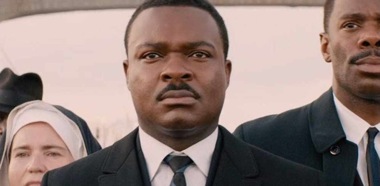SELMA — David Oyelowo as Dr. King
[Film Review]
Selma, Directed by Ava DuVernay
Running time: 2 hours
Selma, directed by Ava DuVernay could not be more timely as we celebrate the 50th anniversary of the March to Selma, Alabama.
More than five hundred marchers made that first attempt. Three thousand would join the second march. Students of all ages, from grade school to graduate school, families, church groups and other social organizations will be restored by the beauty and inspiration of this historically accurate narrative which aptly exposes the mindless brutality of racism.
Nigerian David Oyelowo, portraying the roll of King, and Carmen Ejogo as Coretta allow viewers to experience the huge challenges, both personal and national, faced by Dr. Martin Luther King Jr. and his wife Coretta Scott King. The beauty of their love is wrenching.
The film on multiple levels is stunning, employing the finest techniques to bring to contemporary consciousness the visceral sacrifices and psychological prices paid to secure human freedom. It would take three efforts to cross this bridge in March of 1965, with the first effort remembered as Bloody Sunday when elderly peaceful marchers were tear gassed, trampled by horses and viscously beaten by state troopers.
John Lewis and Hosea Williams led the first march. Hosea Williams said to a congregation later that night that he had “fought in World War II and I once was captured by the German army, and I want to tell you that the Germans never were as inhuman as the state troopers of Alabama.” ( P. 275 King, A Biography, David L. Lewis.)
This film is not weighed down by violence, but reflects a magnificent imagination, from the selection of a global, multi-generational cast from America, Africa and the Caribbean, to the prominence given rolls played by women –especially when Coretta King and a friend provide the long history of what Africa has given to the world. Highly skilled camera work captures so much warmth, love, and beauty. To a person, the acting is just magnificent.
The parameters of Selma are tightly defined, well grounded in its opening, with a tranquil scene between Dr. King and his wife hours before he receives the Nobel Peace Prize. That tranquility is soon shattered by the shocking blast, the bombing of a Baptist Church in Alabama on 15 September 1963 where four “young girls” — Denise McNair, Carole Robertson, Cynthia Wesley and Addie Mae Collins– died terrifying deaths.
In two Brooklyn audiences the first Saturday of January 2015, of three hundred or more viewers, at least half were under thirty and did not know this history. Familiar names, such as Medgar Evers, Jimmie Lee Jackson, Fred Shuttlesworth, Ralph Abernathy, James Forman, James Farmer, Viola Liuzzo, and so many others were unknown to them.
One could hear the sharp gasps as they were surprised by unfolding events: brutality against the elderly, children bombed, the court official’s hostility when a woman attempts to register to vote.
Passionate affirmations often broke the heavy silence that held us together as younger members of the audience connected with the truth. “This is my second time seeing the film,” one older woman said. Of course she had lived through the events. “The first time I brought my eleven year old niece, and my grandson, fourteen. He said he was inspired to do something.”
The many unforgettable scenes include that portrait of African American men all dressed in black suits, with dignity and courage, walking toward a bright day, moving together shoulder to shoulder, spanning the full width of the screen. And equally breathtaking, the portrait of the Edmund Pettus Bridge acting as a broad concrete spine spanning the long hard distance between oppression and freedom. In a softer contrasting scene you will fall in love with life when you see the sumptuous meal so lovingly prepared for a number of freedom fighters. The hugs, joking and laughter remind us that the joy of life is larger than the hatred of men.
In the White House where we see the Civil Rights Leader in conversation with President Lyndon B. Johnson, we actually understand that we are in the presence of a president and a king. We are learning useful lessons in politics, learning to see a larger picture, more than that which is immediately before us. There is no value in exposing the marchers to unnecessary harm. King’s dignity and education offer a sharp contrast to the crude language of the president. In this film, where the intuitive and the technical are finely coordinated, Director Ava DuVernay made a wonderful decision to allow the audience to hear the voice of a contemporary artist as the long, long list of closing credits roll.
From the walls of the African American Museum in Philadelphia this truth: “Emancipation was the beginning, not the end, in the struggle for freedom. The modern civil rights movement and other current day struggles for freedom, justice and equality all derive from those great efforts of over one hundred years ago. Audacious freedom is the heritage, as well as obligation, bequeathed to all of us….”
Thousands have sacrificed for freedom, justice, and equality. The huge cast demonstrates this. As we remember Dr. Martin Luther King Jr. and the many who sacrificed fifty years ago, the film Selma provides a timely reminder that this freedom, audacious freedom is the heritage as well as obligation bequeathed to all of us….”








